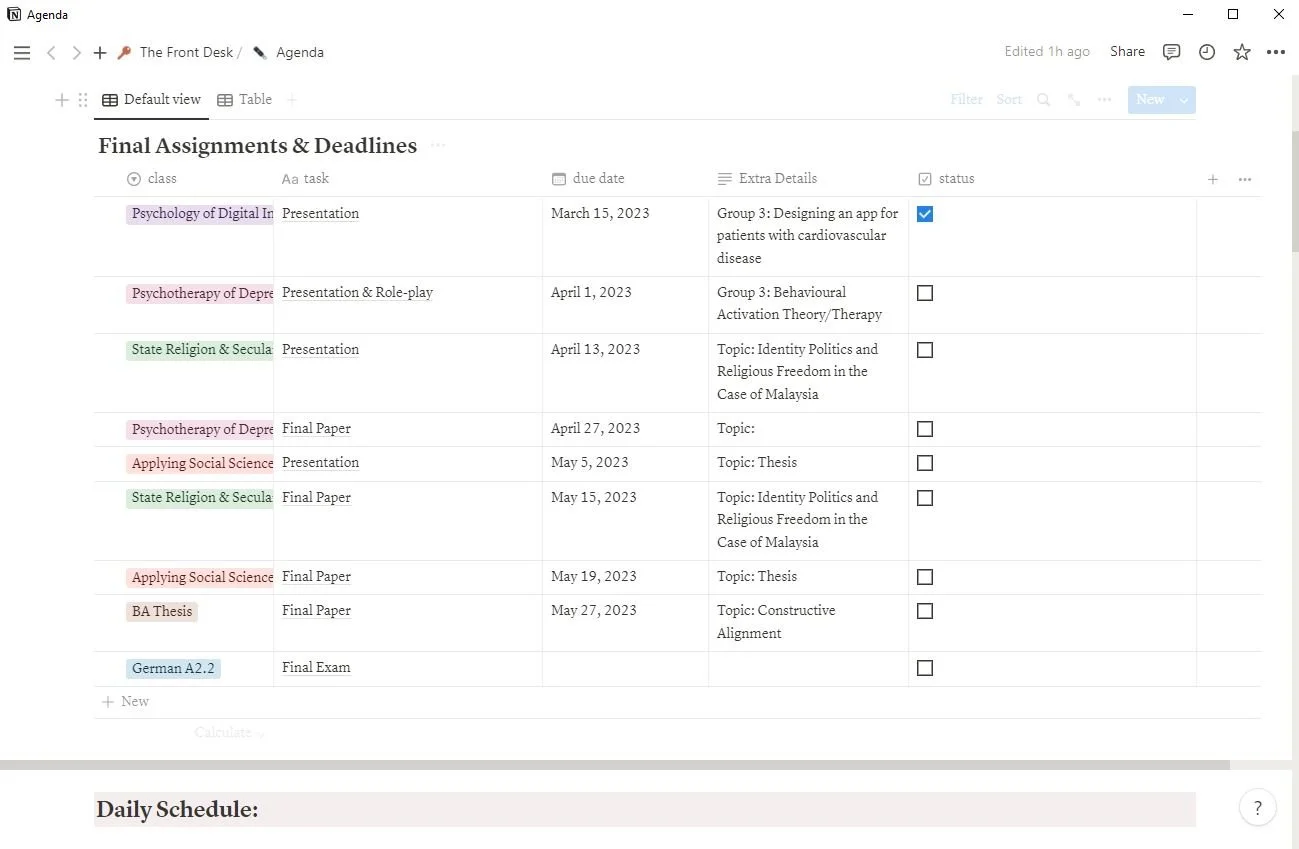Exam season always feels rough – and never-ending. While we obviously can’t avoid feeling underprepared and stressed, there are steps that can be taken to reduce our workload. There are also endless advice pieces and videos on the internet that talk about this, but not enough that address the reality of the situation. So often we find ourselves caged within a seemingly endless cycle of ‘hustle culture’, wherein self-worth and success are marked by quantity (basically how much you work) rather than the quality of your work – and that is only exacerbated by most of these ‘productivity’ videos and articles. Because of this, I’ve compiled several useful and realistic study tips for preparing both ahead of time and at the last minute. Cramming at the last minute is never optimal, but irrespective of how studious anyone is, it’s important to have realistic insights into what exam season could look like in order to figure out solutions to any issue that might come your way.
Studying in advance:
For me, studying in advance would technically begin now, in April. Preparing a month ahead works well for me, but it all depends on how you work best. Some people prefer taking time with their notes (for example, handwriting them instead of typing them out), so if this might be you, “studying in advance” may have already begun! If you have loads of content to learn, or if you’re writing a term paper, then your study sessions might’ve already begun as well.
Regardless, the following tips will still apply to any exam that you’re studying for at least a month in advance:
1) Make a list of final deadlines:
I absolutely love the Notion app for this because of how customisable everything is. Here’s an example of how my deadlines look like for my final semester:

My final semester deadlines!
Not only does this help you prioritise what tasks need to get done first, but also it summarises everything you need to get done. There’s also the added bonus that you are much less likely to forget important deadlines. This way you’ll feel much less stressed and instead be prepared for finals season.
You can use this link to duplicate my template and set it on your own Notion page: https://www.notion.so/Deadlines-Template-be3d70122b9d4b3d9f58d2cb01b2de04?pvs=4. If you also want to start using Notion, here’s the website you can access it from: https://www.notion.so/.
2) Set monthly and weekly goals, and break them down into “bite-sized” tasks:
Setting big goals is useful for you to picture the amount of workload you have. After doing this, it’s easy to break your goals down into smaller, more realistic tasks and complete those throughout the days of the week. For example, if you have a term paper due in a month, this is what your goals and tasks can look like:
Month: Complete term paper
-
Week 1: Conduct research and compile notes
-
Week 2: Write half of term paper and get feedback
-
Week 3: Finish term paper
-
Week 4: Get feedback, make final touches, and submit
Doing it this way means you have flexibility in the daily tasks you choose to do while also giving yourself a firm weekly deadline for a big task that can otherwise be quite challenging to complete. Weekly goals can be divided into smaller ones depending on what you need to get done, ultimately giving you space to maneuver around tasks within the week. Another advantage of this is that, at least for me, it makes work feel less demanding and much more doable. I find that I’m way less stressed about what I need to get done if I plan out my month like this.
3) Prepare now, study later:
I strongly recommend getting all your lecture notes out of the way and to organise all your presentation slides and class material into separate folders on your computer before you get started. This way, you won’t be frantically searching for any course material at the last minute, and you have quick and easy access to all the content in one place. For me, preparing for exams by taking notes and organising class material takes the bulk of my study time, whereas actually learning, memorising, and practicing for the exam takes up much less time once I have all my notes on hand.
When it comes to the final two weeks before the exam, I like to “portion out” my lecture notes for each day leading up to the exam date. For example, there are usually thirteen weeks in most 5 or 7.5 credit courses, which means that each study day corresponds to either one or two lectures’ worth of content to learn, depending on how dense each week is, of course. Since you’d already have your notes laid out, all that needs to be done is to learn! You can read over your notes, the presentation slides for that particular week, complete a few practice questions, and do further research by watching YouTube videos or reading a few research papers that have been published on the topic. You are guaranteed to have a wealth of knowledge and ultimately be well-prepared for the exam by doing this.
Last-minute cramming:
Now, we move onto the more burdensome topic: last-minute cramming. Although I hate doing this myself, I feel like I’ve been in this position so many times that I have a lot of strategies on how to deal with studying for exams on a time-crunch. It’s never an ideal outcome and never a lifestyle I’d like to promote, but it’s relevant nonetheless because it happens, and to exclude this would mean ignoring the possibility of it happening at all. You might have had an event-packed semester, filled with tasks outside your course that you might have been heavily involved in. Because of this, you might find yourself in a position where you need to cram thirteen lectures or complete a term paper in just a few days. Although you may not get the best grade, receiving that perfect 1.0 GPA is forgone when you don’t prepare ahead of time. Worry not! You will still pass (and maybe still get that 1.0, who knows?). Here are my tips on how to deal with last-minute studying:
1) Wake up and get started early in the day:
I cannot stress enough how important it is to sort out your sleep schedule if you’re planning to cram the last few days of your study sessions. Not only is it a good habit, but it also prevents you from being forced to pull an all-nighter. Trust me when I say that I am not a morning person, and that I’d much rather work later at night, but the nature of examinations being held throughout the day makes it impossible for you to pull all-nighters before exam day without negatively affecting your ability to retain knowledge.
I know I just mentioned cramming, but it’s also important after a long session to wind down in the evening by practicing any method of self-care you’re used to. Realistically speaking, you will feel burnt out doing this (as with any last-minute cram session), but the important thing is that you’d feel less burnt out. I’ve been here too, and speaking from experience, pulling all-nighters before any written examination makes me feel absolutely terrible. During the exam, I find that my brain ends up switching off in the middle of figuring out the solution to a question, which makes it feel like all the time, energy, and mental effort spent into completing the all-nighter has now been made redundant. Unfortunately for all of us night-owls, I think waking up and studying early in the day for written examinations is the best strategy for last-minute cramming – and also to retain your own sanity[LM2] without getting burnt out!
However, to please all the night-owls out there I feel that it’s important to mention how much I love pulling all-nighters to work on assignments and term papers. Not only is it infinitely less distracting than writing during the day because of how quiet your environment is at night, but personally I find that my best ideas come during those times. Articulating my thoughts comes naturally to me more at night than during the day, and I feel that I’m much more creative when it’s late.
2) Find a study buddy:
There is never a shortage of people who are also cramming for exams, just like you. I find it relieving to have cram sessions with someone who is also as unprepared as I am because it makes me feel much less guilty for not studying as much as other people. Having someone who’s in the same boat as you can ease the pressure and stress of dealing with long study sessions, and if you both are in the same course then that’s even better! You can test each other’s knowledge and answer any questions the other person might have about the course content.
3) The Pomodoro technique:
The Pomodoro technique is so useful for cram sessions, because it makes sure you get a lot of things done in a scheduled amount of time. The original Pomodoro method entails that you spend 25 minutes studying and take a 5-minute break, and that you repeat this cycle until you’ve done it four times, after which you take a break for 15 – 30 minutes. I personally don’t like how short the 25 minutes feel, so I prefer doing the same cycle but instead doubling the time spent. This means 50 minutes of deep and concentrated studying, followed by a 10-minute break, and after the fourth session, rewarding yourself with a 30 – 60 minute break. This frees up more space to have a meal during the fourth break, and makes sure that you don’t ignore your physical health in the midst of all this cramming. It’s also important to mention that the short breaks of 5 – 10 minutes shouldn’t include using your phone or going on social media at all, which can be saved for the longer break.
A useful app for this is Forest, which I have been using since high school. You can find more information about it on: https://www.mobileappdaily.com/app-review/forest-stay-focused-app. You can also download it here: https://www.forestapp.cc/. Here’s a short infographic on how to use it:

[Singh, P. (2022) Forest app: Stay focused and get things done, Mobile App Daily. Available at: https://www.mobileappdaily.com/app-review/forest-stay-focused-app (Accessed: March 20, 2023).]
That concludes this article on tips for maintaining your productivity during exam season! As a side note, I really want to mention the importance of taking care of both your physical and mental health during exam season. I know that while exams feel more pressing and time-sensitive than your physical or psychological needs, ignoring your health can potentially lead to significant long-term consequences. Stress and burn out is a horrible feeling, so please make sure that you allocated a couple hours each day to relax and take a step away from work. Try to be kind to yourself if you’ve had a slow and unproductive study day, and remember that you can always adapt to whatever situation comes your way.
Best of luck with exams, you’ve got this!
BY KAYLA COLLETT (UK & MALAYSIA) | CLASS OF 2023

